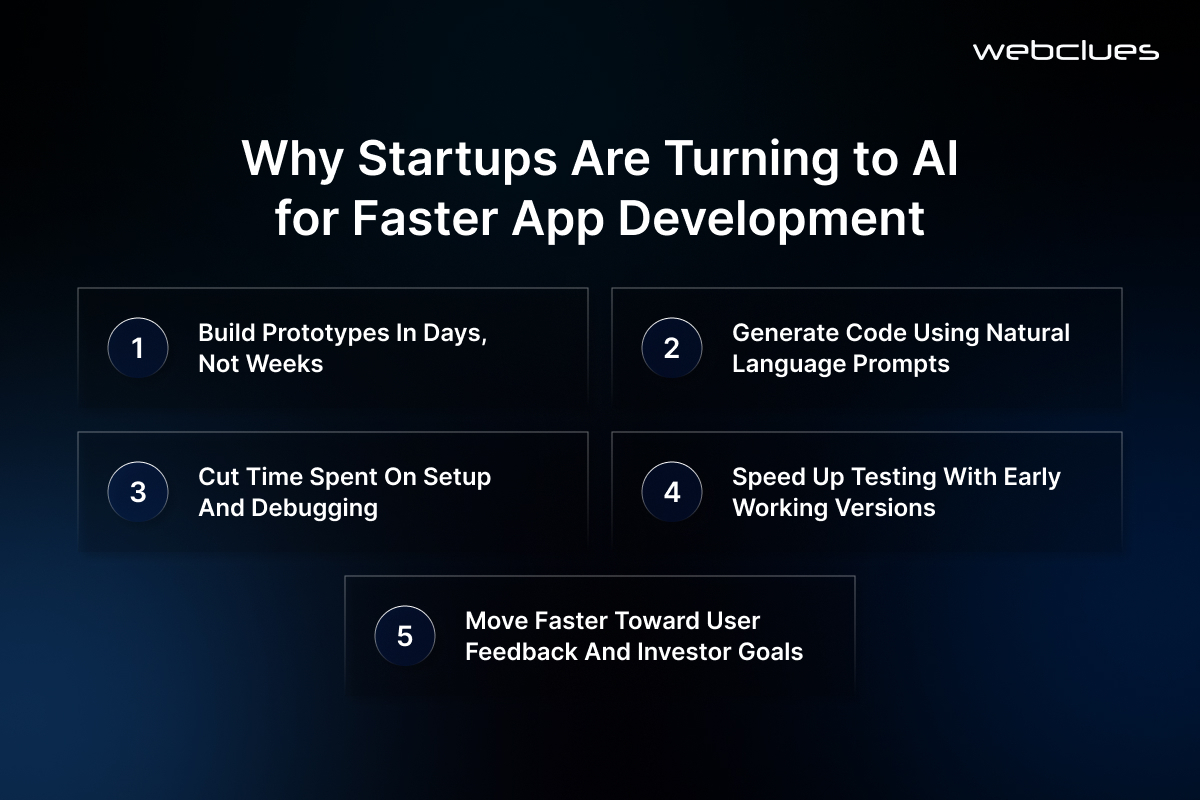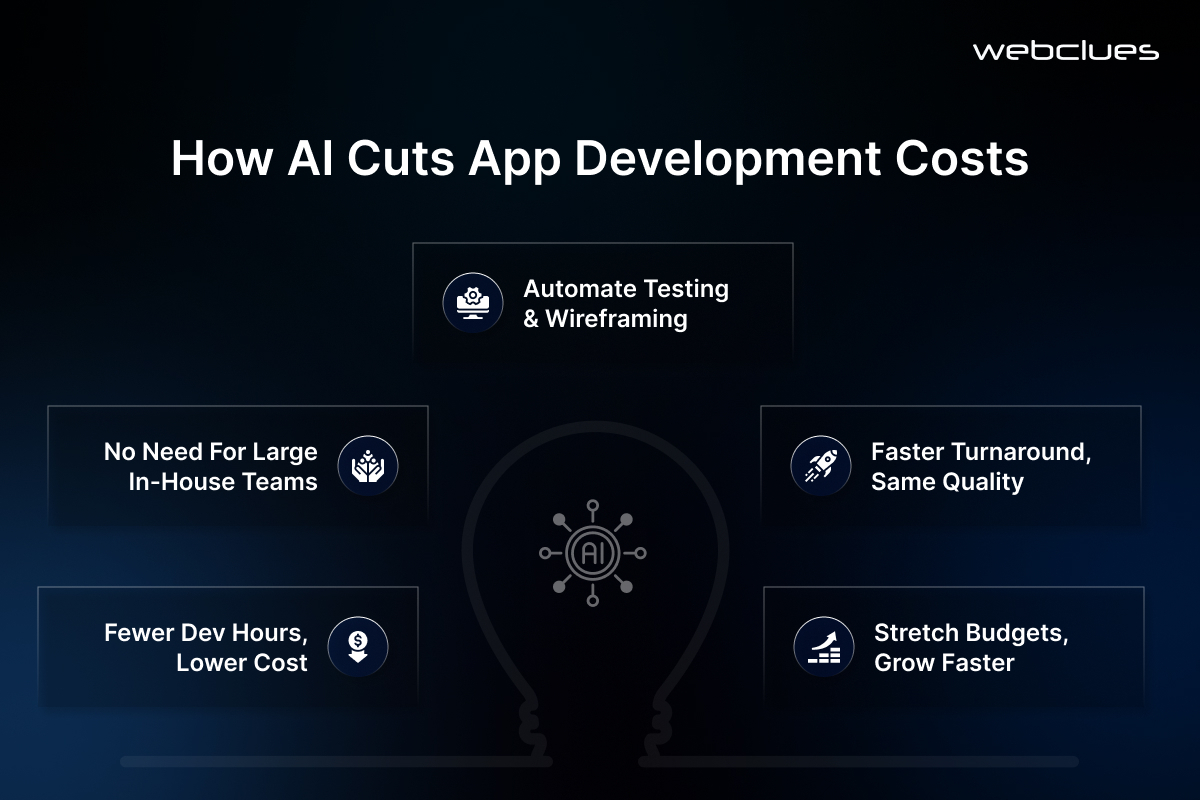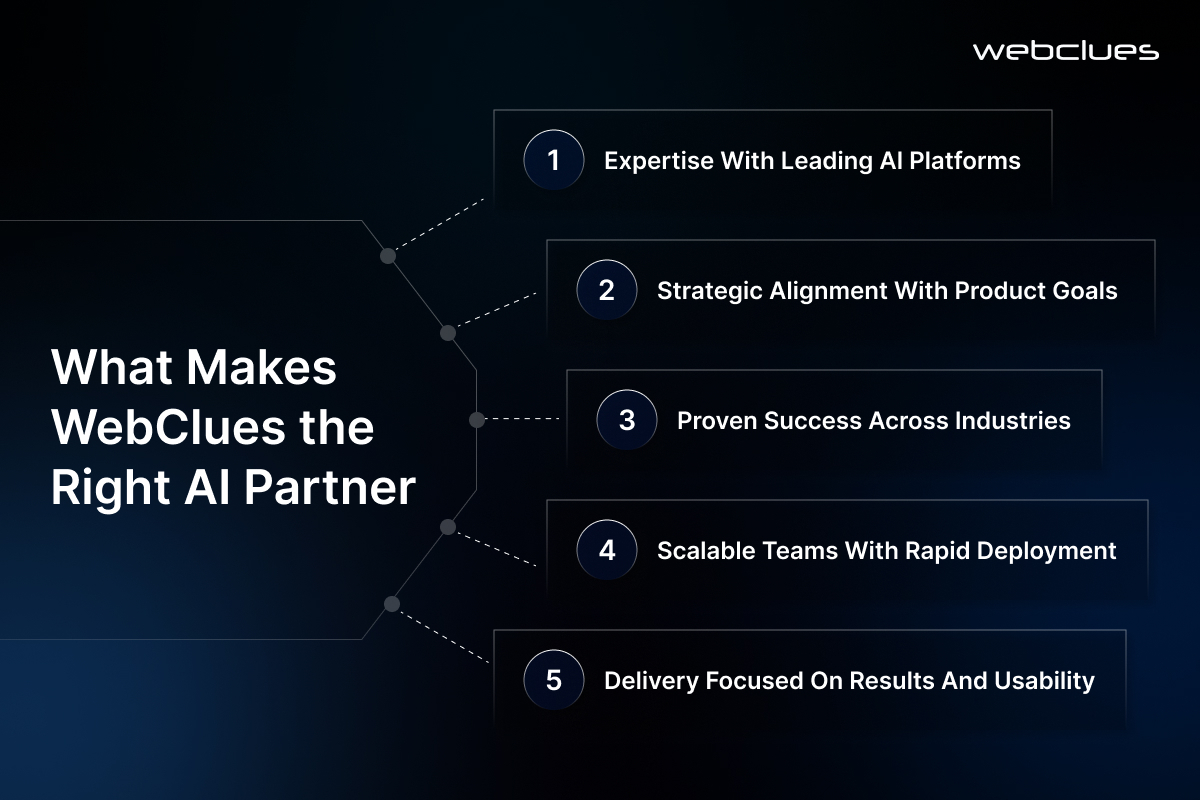How AI Is Reducing App Development Costs for Startups
.jpg)
Building a product as a startup usually means working with limited time, money, and people. There’s always pressure to move fast, keep costs down, and get things right with a small team. That’s why the choices you make early on can shape how far and how fast you go.
AI is no longer something to explore later. For many startups, it’s already playing a key role in how apps get built. From speeding up development to reducing repetitive work, AI is becoming a practical tool that helps small teams do more.
This shift brings clear advantages. Development becomes faster, projects stay cheaper, and workflows get smarter.
In this blog, we’ll look at how AI development services are helping startups build better products with fewer resources without cutting corners.
How AI Makes App Development Faster
For startups, speed can often be the difference between being first to market and getting lost in the noise. That’s where AI-powered app development is starting to show real impact.
Today’s AI tools are good at handling the parts of development that slow teams down. Platforms like GitHub Copilot, Replit, and Codium can generate lines of code based on natural language prompts. They help fill in boilerplate code, offer real-time suggestions, and even flag bugs as you write. This cuts down the hours spent on setup, repetitive functions, and trial-and-error debugging.
Startups are using these tools not just to write faster code, but to prototype faster too. With AI-assisted frameworks, early versions of an app can be spun up in days instead of weeks. This gives founders and product teams a working version they can test, tweak, and ship quicker than ever before.
Faster development doesn’t just save time. It shortens the feedback loop, speeds up user testing, and helps teams act on real-world data sooner. For startups trying to hit that next milestone or investor meeting, shaving even a week off development can make a big difference.

How AI Makes App Development Cheaper
For most startups, development costs are one of the biggest line items. Every sprint, every feature, and every bug fix adds up. That’s where AI development services are starting to shift the math.
When you use AI tools that speed up code generation, testing, or even design, you naturally cut down the number of developer hours needed to get the job done. And fewer hours usually mean lower overall costs.
Many startups are also moving away from building large in-house tech teams right at the start. Instead, they’re outsourcing parts of their AI projects to development partners who already work with these tools every day. This makes it easier to get the same results without hiring full-time specialists too early.
AI is also helping startups allocate their resources more efficiently. Instead of putting a developer on repetitive testing or manual wireframing, those tasks can be handled by AI-powered tools. This frees up the team to focus on logic, UX, and features that actually move the needle.
Even when startups need something custom, AI can still help reduce the cost. From AI-generated mockups to automated bug detection, these tools bring efficiency at every stage, not just in the backend. What used to take weeks of back-and-forth can now be done in a few days, without compromising quality.
For early-stage teams trying to stay lean, these cost savings can stretch budgets further and lead to faster growth.

How AI Makes App Development Smarter
Building faster and cheaper is only part of the equation. The real edge comes when your app is also smarter from the start. That’s where AI begins to add deeper value.
One of the biggest time-sinks during development is quality assurance. AI testing automation tools can now run test cases, flag bugs, and even suggest fixes without much manual effort. This doesn’t just speed up QA; it helps catch issues early, before they turn into costly problems after launch.
Alongside testing, AI opens the door to smarter features. Startups are using machine learning models to add things like personalized recommendations, predictive search, and intelligent notifications. These features used to take months of data work and modeling. Now, with the right setup, they can be added in a fraction of the time.
AI also helps teams make better product decisions. By feeding real-time analytics into AI-driven feedback loops, teams can learn how users interact with the app and where improvements are needed. This kind of insight is hard to match with manual analysis alone.
The result is a better app quality and fewer post-launch surprises. For any startup, that means happier users, fewer support issues, and a smoother path to scaling. A reliable AI solutions provider can help teams bring this kind of intelligence into their apps without overcomplicating the build process.
AI Tools That Startups Are Using Today
A big reason AI is becoming so useful for startups is the growing list of tools that fit right into the development process. From code to design to testing, there’s now an AI tool for almost every stage of building a product.
For coding, platforms like GitHub Copilot, Replit Ghostwriter, and GPT-4 are helping developers write cleaner code faster. These tools can generate functions, suggest logic, and even help explain what existing code does. For small teams juggling multiple priorities, that kind of support is a big time-saver.
On the design side, tools like Midjourney and DALL·E are being used to generate visuals, UI mockups, and even early-stage branding ideas. They’re not replacing designers but helping teams get to a visual direction faster without staring at a blank canvas.
Quality assurance has also seen a big shift. Startups are using tools like Testim, Fireflies, and other AI-driven testing platforms to run automated test cases, spot bugs early, and speed up release cycles. These tools reduce the need for manual testing and give teams more confidence before shipping.
Most importantly, these AI development tools don’t require full tech overhauls. Startups are plugging them directly into existing workflows using Copilot inside VS Code, generating UI drafts during sprint planning, or automating test runs before release.
The result is a smoother, faster, and more flexible development cycle that helps startups move from idea to product with less friction.
Cost Breakdown: Traditional vs AI-Augmented Development
One of the clearest ways to understand the impact of AI on software development is to look at the numbers. When startups replace or support parts of their workflow with AI development tools, the savings add up quickly, especially in the early stages.
Here’s a simple comparison between traditional app development and AI-augmented development.
| Category | Traditional Development | AI-Augmented Development |
| Time to MVP | 12 to 16 weeks | 6 to 10 weeks |
| Team Size | 6 to 8 members | 3 to 5 members |
| QA & Testing Costs | High (manual-heavy) | Moderate (AI-driven automation) |
| Maintenance Overhead | Ongoing debugging and fixes | Lower due to early issue detection |
Startups that use AI to reduce software development cost often see a 20 to 40 percent drop in time and budget needed to get their first version live. That’s not just about skipping steps. It’s about doing things smarter with the right tools.
Low cost AI app development is really all about cutting waste instead of corners. With better allocation of tasks, faster iteration cycles, and fewer people needed on each sprint, AI development services are giving startups a clear edge where it counts most: speed, efficiency, and output.
How to Hire AI Developers or a Reliable AI Development Company
Once you decide to bring AI into your development process, the next step is finding the right people to help you do it. Whether you’re hiring individual AI developers or looking for a full-service AI development company, picking the right partner can make or break your build.
Start by looking for teams that understand both the tools and the problem you’re solving. A strong AI consulting service will not only know how to use the latest models and frameworks but will also know when not to use them.
For most startups, the choice often comes down to building in-house or outsourcing. If you’re working on a long-term product and already have technical leadership, hiring in-house developers might make sense. But if you want to get to market quickly or explore a specific feature powered by AI, outsourcing is usually more efficient and cost-effective.
Here’s a quick checklist for startup founders:
- Toolstack Knowledge – Does the team have hands-on experience with tools like GPT-4, Copilot, Testim, or other AI development platforms?
- Domain Understanding – Do they understand your industry, users, and product goals well enough to apply AI meaningfully?
- Proven Track Record – Can they show past work, case studies, or references that demonstrate what they’ve built?
If you’re exploring your options, WebClues Infotech brings deep experience in AI development services. We’ve worked with startups across industries to build smarter, faster, and more scalable products using AI. Whether you’re looking to test a new idea or scale an existing app, connect with us, and our team can help you build with the right balance of people, tools, and strategy.

Use AI the Right Way, Not Just the Fast Way
AI can be a powerful tool for startups, but only when it’s used with a clear purpose. It’s not about chasing hype or replacing your team. It’s about building smarter, using resources better, and getting to market without burning through time or budget.
For mobile app development startups, especially, AI can give a real edge. You move faster by cutting dev time. You spend less by doing more with a smaller team. And you build smarter by catching bugs early, improving UX, and launching with better features.
That said, AI works best when it fits into a larger plan. If you're building something complex or niche, you’ll still need custom AI development and real product thinking behind it. Let AI do what it does best, but make sure your decisions are driven by the problem you're solving.
Startups that use AI with focus and clarity stand a better chance of building products that last.
Build Your Agile Team
Hire Skilled Developer From Us
Reduce your app development costs using WebClues’ AI-driven workflows built for lean startup execution.
Our AI-first approach replaces repetitive dev cycles with automation, smart QA, and rapid prototyping. Startups save time and budget without sacrificing quality, using tools and strategies proven to cut early-stage build costs.
Let's Discuss!Our Recent Blogs
Sharing knowledge helps us grow, stay motivated and stay on-track with frontier technological and design concepts. Developers and business innovators, customers and employees - our events are all about you.





